It’s a wrap: Rohingya refugees upcycle hopes and dreams in Bangladesh
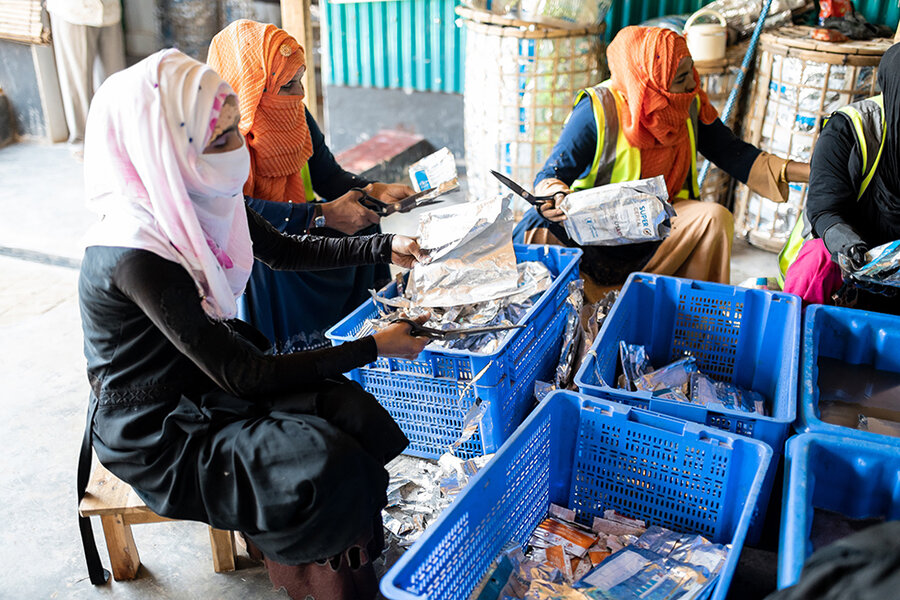
The bustling lanes of Kutupalong, the world’s biggest refugee camp in Cox’s Bazar, Bangladesh, are always full of chatter as they wind through busy makeshift bazaars.
The camp is home to more than 860,000 Rohingya refugees from neighbouring Myanmar, all of whom receive support from the World Food Programme (WFP) .
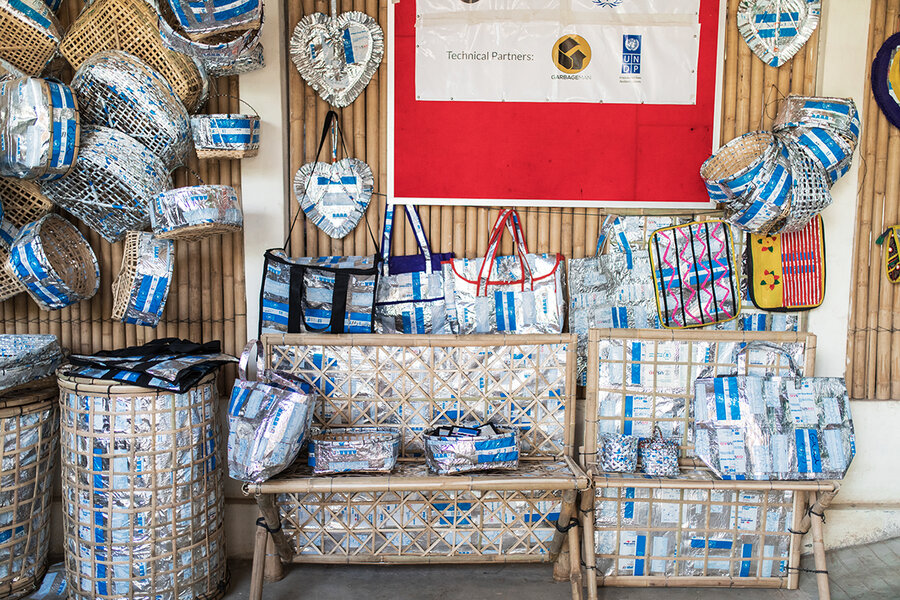
Seasonal fruits and vegetables, betel leaf, clothes, locks and keys - whatever people need, the bazaar’s got it. Disappointment only creeps in with the piles of general waste.
The Rohingya camps generate 119.8 tons of waste per day. Much like everywhere else, the waste problem in the camps demands a sustainable solution.
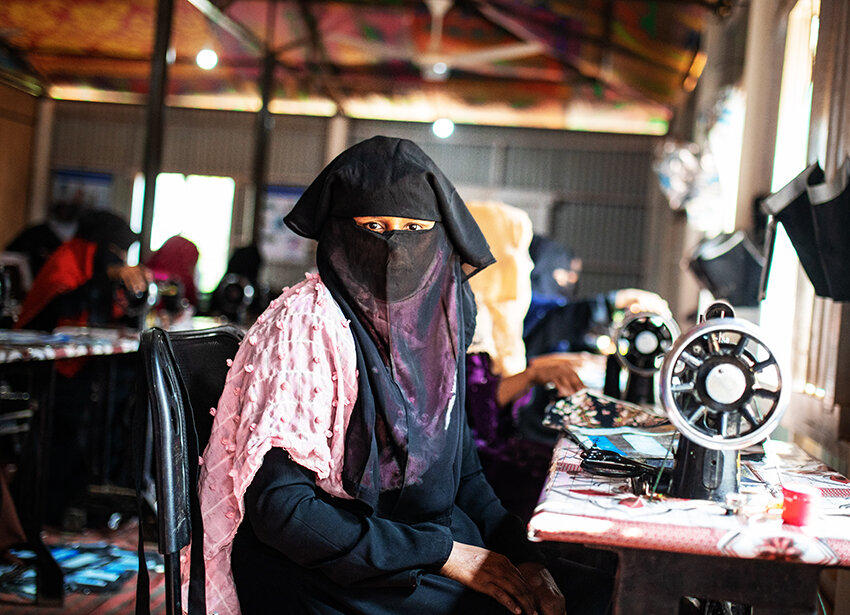
One way WFP is setting out to offset packaging waste is upcycling. Food from WFP’s e-voucher outlets, where Rohingya families choose their groceries every month, is packaging-free, but wraps have to be used for fortified food and special nutritional products.
Through a new upcycling centre, this packaging waste is transformed back into useful products. Rohingya refugees have been able to brainstorm, design, and create user-friendly products from waste.
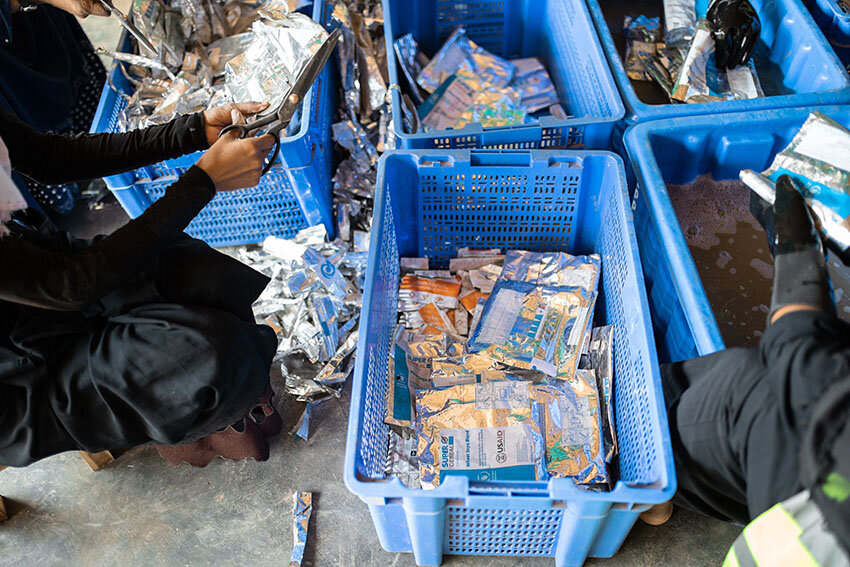
“My life is much better now — I can send my children to school,” says Sayeda, a Rohingya woman who makes different types of bags and masks using upcycled material and her skills as a tailor.
“Now that I have started to earn, I am treated well by other people in my community. The centre has upcycled over half a million food packets into 2,500 different products since it started operating last September.”
From wallets and different kinds of bags — totes, pouches, zippers — to bins, baskets, bracelets, floor mats, and pen holders, it is experimenting widely with its product types and designs.

Made of aluminium metallized film, the empty packets are collected from families and WFP’s nutrition centres every week. The volume of the collection varies. In April, a total of 12,773 single-use sachets were collected.
From the beginning until the end, the process maintains a clear division of labour. Walking inside the centre, one can immediately spot the different groups working together on different tasks.

Packaging is sorted, washed, dried, compressed and processed by different groups. Each group consists of six to seven volunteers from the Rohingya community. Currently, there are 86 volunteers working in the centre; 41 men and 45 are women.
After the fire: WFP assists Rohingya refugees in Bangladesh
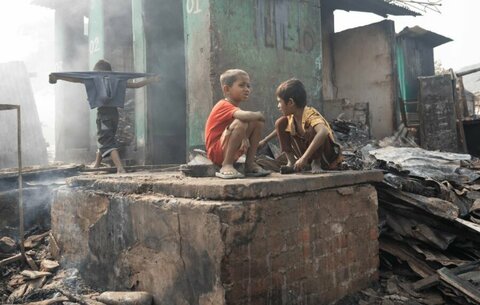
The Rohingya refugee crisis added to an already challenging task of waste management in this part of Bangladesh, which relies on its coastlines and forests for food and livelihoods.
Upcycling helps to keep the camp environment clean in two prominent ways: preventing the risk of floods and keeping the groundwater safe. Most of the household waste in the camps ends up in the canals and poses a big threat of flood during the monsoon season. As part of the monsoon preparedness plan this year, 80km of canals and drains were cleared and waste collected from these places.

Diane Broinshtein, the programme policy officer heading WFP’s Self-Reliance for refugees programme in Cox’s Bazar, says: “Minimizing the impact on the environment moving forward is important, and WFP has a big part to play in that. It’s up to WFP to ensure the impact of its work creates no negative side-effects, and this centre addresses that need.”

Sarah Barnhart, a safeguard specialist for WFP at Cox’s Bazar, explains that waste can create a significant threat, especially for groundwater. It secretes harmful and toxic chemicals like leachate which, if not cleared, infiltrate the groundwater, depending on the flow of water and depth of the aquifer.
“WFP is making efforts to breathe a second life into food-packaging waste introduced in the camps, aiming to improve the sustainability of the operation and the environmental health of the camps and surrounding areas,” she says.
Apart from the environmental benefits at the so-called end-of-life stage of packaging, the centre is also creating work opportunities for the Rohingya community, especially for Rohingya women.
Work at the centre is the first of its kind for many of the female volunteers. Ayesha is one such. While meticulously washing a ready-to-use therapeutic food packet, Ayesha recalls her days in Myanmar, where she seldom worked. “I didn’t know that women can work outside their homes. I had never seen any Rohingya women working in Myanmar,” she says.

Zainu, Ayesha’s groupmate, adds: “Our girls were never allowed to receive any education beyond tenth grade. How could we know that women can work if we never saw them doing that?” Both Ayesha and Zainu hope that they are setting examples for their daughters by working here. Receiving a packet from Ayesha, Zainu wipes it and says, “My daughter now sees me coming to work. She will grow up knowing that her mother worked, and so can she.”
The upcycling centre is made possible with generous support of donors from Canada, Norway, Sweden, and the UK


